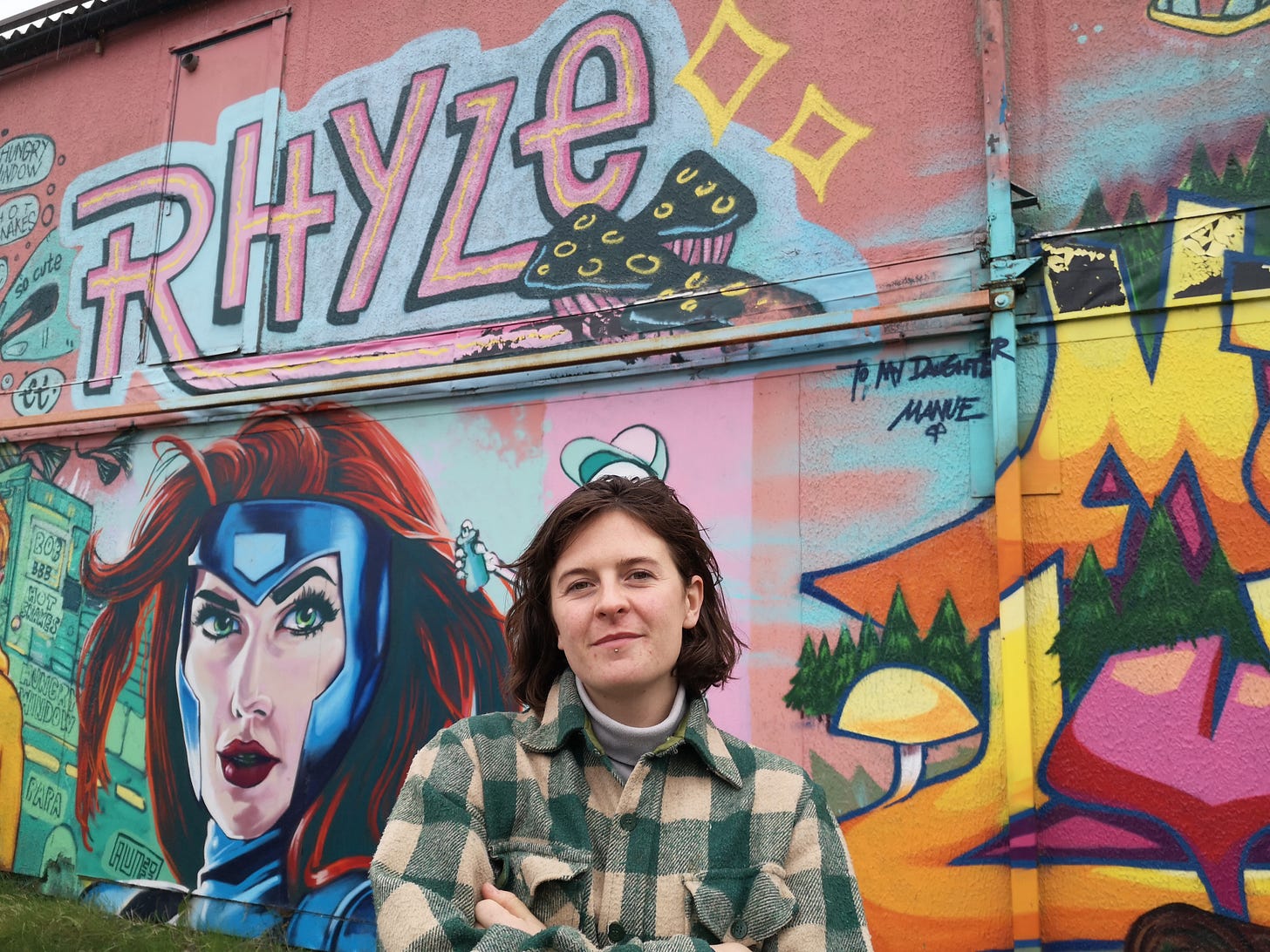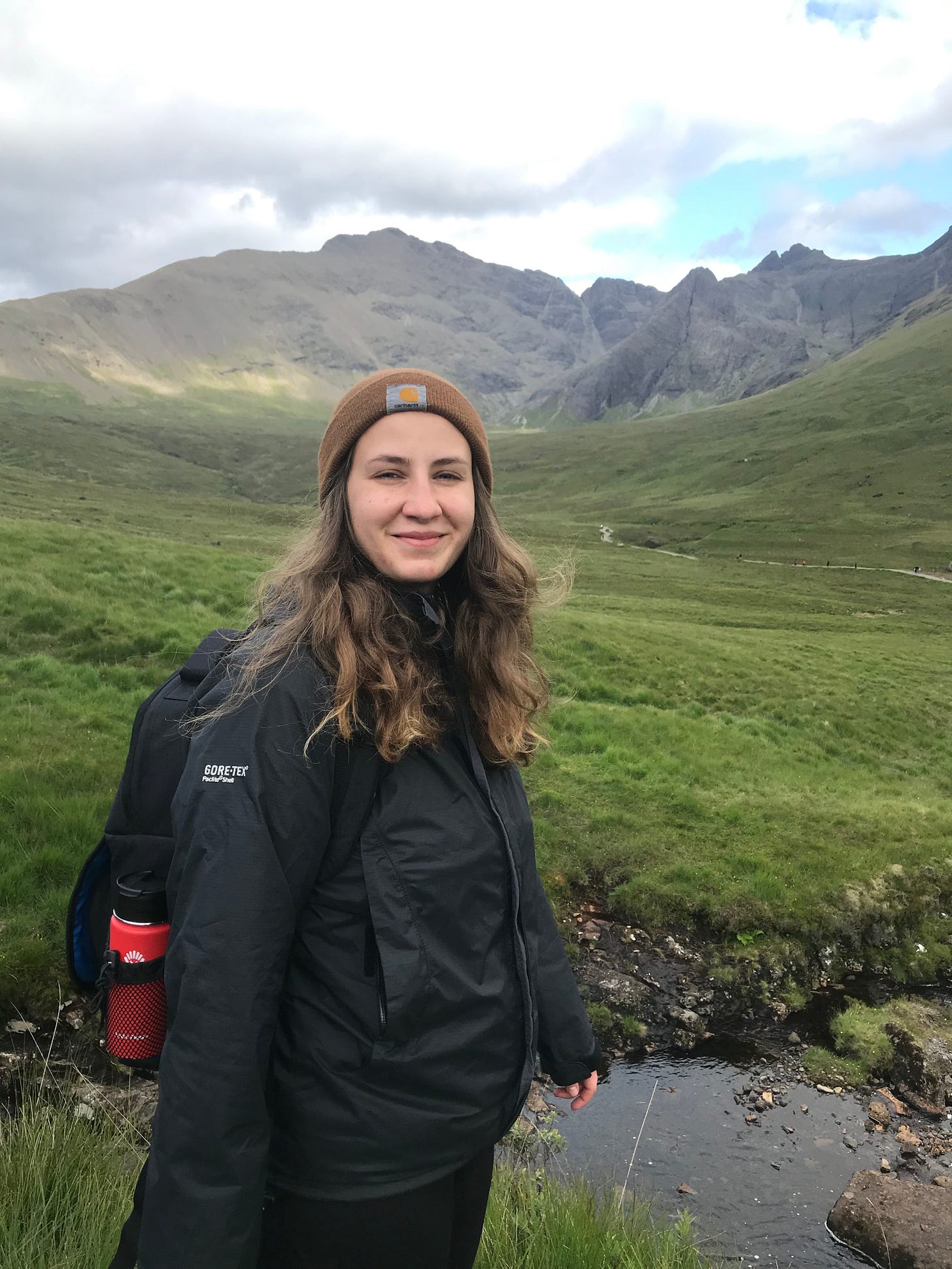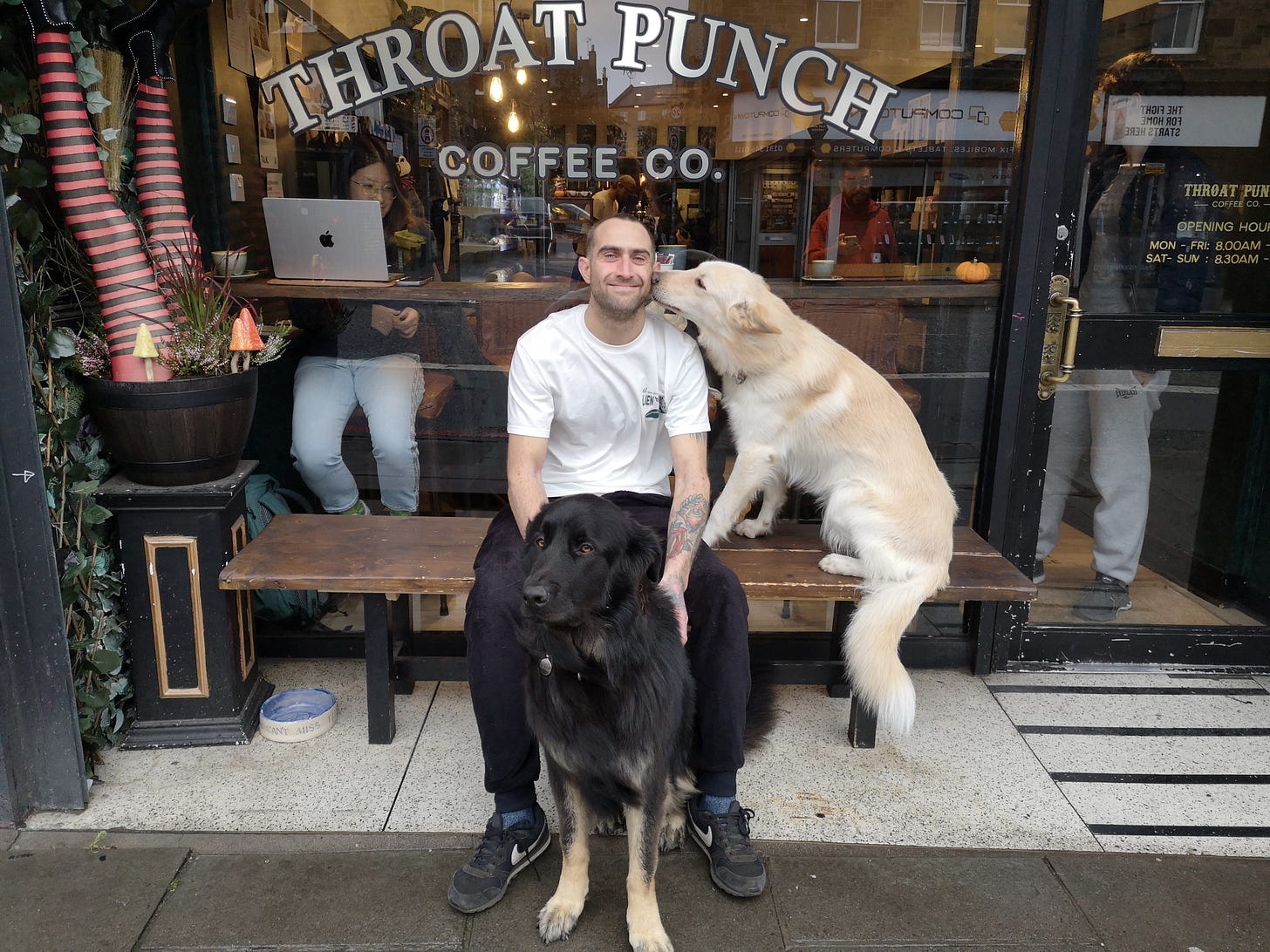Trailblazers changing the city's daily coffee grind for the better
From a mushroom farm to bath bombs: How our takeaway leftovers are being put to good use
Ninety-eight million. That’s the estimated number of cups of coffee we drink across the UK each day. Every espresso shot uses around 12 grams of coffee. A staggering 99% of that is discarded and tapped into bins as waste.
With coffee shops and cafés on it sometimes feels like every street corner, Edinburgh is clearly as much addicted to the caffeine buzz from a great coffee as anywhere. There is certainly no shortage of choice when it comes to grabbing a latte or flat white at almost any hour. But are we missing a trick?
Zero Waste Scotland calculates that an additional £500 £800 million could be generated for Scotland’s economy by seeing food and drink by-products as a valuable resource instead of viewing them as rubbish.
Much of the city’s coffee grounds that do not end up in landfill, including those from many cafes, are currently processed using anaerobic digestion. It takes 30 days at 40 degrees and the help of microorganisms to turn it into biogas which is used to make renewable electricity and fertiliser.
Finding alternative offers businesses the chance to turn them into something more valuable.
One ingenious project repurposing discarded coffee grounds is the urban farm Rhyze Mushrooms. You can find them on a patch of derelict land opposite Broughton High School.
The non-profit, community interest company and workers cooperative is run from inside recycled shipping containers, hidden behind a wooden hoarding next to the Union Canal.
Mim Black, communities coordinator at Rhyze Mushrooms, tells me that coffee is a perfect example of how messed up our food system has become.
“It is a tropical crop that’s grown thousands of miles away, shipped here, used once and then thrown away. The impact that coffee growing has had around the world is huge and extremely negative.”
The project grows oyster, turkey tail and lion’s mane mushrooms in carefully controlled conditions. The fungi are grown in a substrate created by a mixing of 20% coffee grounds and 80% sawdust, collected from local cafes and carpenters.
“As far as they know we are the only urban mushroom farm growing one hundred per cent on waste. We also use coffee chaff, which is the husk of the coffee bean, another byproduct of roasting coffee.”
The project started when the founders decided to make a positive difference to local food production and turn waste into something useful, creating their own miniature circular economy.
From inoculation to eating, it only takes four to six weeks for mushroom cultivation to happen and you can farm them all year round. At the moment they harvest around tenkilos of mushrooms a week. You can buy their mushrooms directly from the farm or from local greengrocers, New Leaf Co-Op, 23 Argyle Place, Marchmont, and Dig In, 119 Bruntsfield Place, Bruntsfield. Any leftovers are dehydrated and turned into medicinal tinctures which are said to help boost the immune system.
The Rhyze team also make and sell fungi grow-at-home kits to help raise funds for the project. Every Friday afternoon volunteers come to lend a hand and learn more about the fascinating world of mushroom cultivation.
At present, Rhyze Mushrooms only need a few kilograms of coffee grounds, which they collect from local cafes on a cargo bike.
“Being able to repurpose waste feels really good. Even though in the grand scheme of things we're only making a small difference,” says Black.
“We do have ambitions to dramatically increase the amount of mushrooms we are growing and make a real dent in how people are eating in the city.”
The farm is on the lookout for a new site to start growing more mushrooms. What they are looking for, Black explains, is “ideally somewhere to house three 40ft shipping containers with space to work and extra storage. We need power, water and grey water disposal. We would love outdoor space, but it’s not strictly necessary.”
Bath bombs to chicken bedding
Someone else devoted to alternative uses for coffee waste is Olivia Thoroughman-Henderson, marketing manager for a not-for-profit initiative called Circular Coffee Scotland.
It is a community of people and organisations working together to take the production and consumption of coffee in a more sustainable direction. Their primary objective is to upcycle coffee waste and their dream to turn Scotland into a world leading circular economy in the coffee sector.
The organisation was set up by Artisan Roast, a coffee company that has sustainability at its heart. Their original café is on Broughton Street, they also have cafes in Leith, Bruntsfield and Stockbridge, with a pop-up near the St James Quarter.
Thoroughman-Henderson says: “Everybody drinks coffee or tea and know about coffee grounds. In the UK, we produce around 500,000 tonnes of coffee waste a year, rough calculations suggest that’s an average of 40,000 tonnes created in Scotland, and in Edinburgh that means we produce around 3,700 tonnes of coffee waste every year. An average family car weights around 2 tonnes.
“There's always something that can be done to enjoy coffee more responsibly, you can visit @circularcoffeescotland on Instagram for ideas on how to recycle spent coffee waste at home.
“It's also about the little things, like making sure your coffee bags are recycled. We accept all bags back to our shops or you can also take them to be recycled with grocery bags at larger supermarkets.”
It turns out used grounds can be made into body scrub, compost, coffee candles, wood stain and filler, bath bombs, insect repellent, and even chicken bedding. If you want to give it a go, you can collect dried spent coffee grounds to reuse from Artisan Roast’s Stockbridge café.
CIrcular Coffee Scotland has also been investigating other uses, like turning grounds into biomass pellets, with the help of the Universities of St Andrews and Chile.
Thoroughman-Henderson explains: “Coffee has such great visibility, drinking it is something almost everybody does every day. We're just trying to make people think about what they see as waste. We're not perfect, but we constantly try to be better. It all comes back to a circular economy - there are so many different things that we waste every day that we could be reusing.”
From Edinburgh to the world
Another Edinburgh company doing pioneering work on sustainability is Vegware. Now owned by US- company Novolex, they produce a range of fully compostable plant-based packaging including takeaway coffee cups, which are now sold in seventy countries across the world.
Every month from over fifty sites in the central belt, between 12-14 tonnes of used Vegware products are collected. This compostable catering waste is turned into high-grade agricultural compost near Perth.
The method used is in-vessel composting which takes 12 weeks to transform their products, mixed with green waste and food waste, into compost. The heat generated naturally allows the materials to break down to produce compost and doesn’t use any harmful bacteria.
Vegware senior waste management consultant David Dyce says: “That’s a pretty impressive volume when you think that most of that amount is fairly light packaging. There are not many companies that put this much effort into end-of-life packaging.”
He explains there are policy changes on the horizon, scheduled for October 2025. A mandatory cup takeback scheme which will require all businesses with more than 10 employees that provide paper cups to host a takeback scheme for customers, and report on the volume sold and number of cups being sent for recycling.
Another will see producers paying slightly more for the products they put on the market, with a favourable rate of payment, depending on how easy they are to recycle. The money from that scheme will be earmarked to help local authorities to handle and expand waste setups.
He warns: “They will change the landscape dramatically with more businesses looking for compostable solutions.”
‘It’s like travelling back in time’
If you are still addicted to grabbing a coffee on the go, why not go out of your way to support local independent coffee shops that are doing their bit to be more environmentally aware? Places like Throat Punch Coffee Co, Haymarket, co-owned by Alex Pickering, a former offshore worker, who has swapped working with one type of black gold for another.
Pickering says: “Coffee is such a wasteful industry, but you can't grow it anywhere near here, so it has to be shipped. I did an environmental science degree on my downtime offshore. Here we try to be as environmentally friendly as possible, it's just not always 100% possible.”
Throat Punch started online initially in 2018, selling roasted coffee blends and coffee-making equipment, with sales rocketing during the pandemic, as more people were forced to become home baristas.
After the pandemic, they opened a coffee shop where they sell super-strength ground coffee. One 100% single-origin Robusta, called Indian Cherry has three times the caffeine content of an average Arabica. It is also the coffee of choice for some powerlifters, cyclists and mountain runners who want a natural pre-workout boost, as well as those who just need maximum amounts of caffeine in the morning.
They also sell less intense brews, but Pickering has recently installed an old school, Francino manual pull espresso machine. It is gravity and pressure-fed so does away with electric pumps and uses less energy.
He jokes it is like stepping backwards in time. “It's the difference between a no-frills 1960s Ford with very little electrical engineering, compared to a modern Porsche, where you need a guy with a modern laptop to come out and plug it in and tell you that you've got a flat tyre.”
It does the same job and helps him reduce energy consumption. He adds: “I really love it, it's basically just a boiler with a gravity and pressure system.”
The Francino machine, allows the baristas to make subtle changes that they wouldn’t be able to do with a more high-tech automated machine. He explains, ”I can slow the pull-down movement, or I can speed it up.”
“When you pull the lever - It's absolute silence…. all you'll hear is the espresso hitting the cup. It is like stepping back in time to how things used to be.”
Pickering explains the other measures they have adopted to be more environmentally friendly. “We use suppliers that don't use plastic, our dairy and oat milk are supplied in glass bottles which get returned to be reused, and our takeaway sleeves, cups, and lids, are sourced from Decent Packaging and are biodegradable. We also stock reusable coffee mugs which are made from single-use paper cups.”
But to encourage a change in people's drinking habits they introduced a 25p charge per each takeaway cup. They used to give a 10% discount if you brought your own cup. Interestingly, the increased price caused more customers to start bringing in their reusable cups.
He says: “It's just the mentality of spending money on a cup you know you're going to throw away in about five minutes. Now I would say about half of our customers now come in with their own cup, whereas before, it was just a handful.”
The café also grows uses biodegradable and reusable bags for the coffee it sells, discounts to customers and uses ChangeWorks to collect and recycle its waste, which he says is a major expense, “I would love to have a better option for coffee grounds, but I just haven't found it.”
They also offer bespoke bean grinding for customers in small amounts so it doesn’t turn stale and go to waste. He proudly says: “It's probably not that huge in the scheme of sustainability in the coffee industry, but as a small independent shop it is a good service to offer.”
Other Uses Of Your Old Coffee Grounds
Finding alternative uses for coffee grounds is a bit of a cause célèbre. Recently engineers from Royal Melbourne Institute of Technology have found a way of making thirty percent stronger concrete by adding coffee grounds. While here in the UK, Culthread, sells products made from vegan leather recycled from 30% coffee grounds, and 70% water bottles. London-based UpCircle repurposes leftover coffee beans from cafes into soaps, face masks serums and exfoliators while in Wales, Grounds for Good makes gin. But Scotland is also in on the act, Glasgow-based company Revive Eco has developed technology to extract coffee oil from coffee grounds.
Fergus Moore and Scott Kennedy, the co-founders, started their business with the idea to collect spent coffee grounds and turn them into fertiliser on an industrial scale. They both worked in cafes they were aware of the scale of the problem and came up with the concept while studying business at Strathclyde University.
Since 2019 they have refocused the business away from large-scale composting, towards a more high-tech solution that is both efficient and cost-effective.
Fergus Moore tells us: “When you make a cup of coffee, you only actually use or extract about one per cent of caffeine content, and flavour. At Revive Eco we are focusing on the other 99 per cent, which contains a lot of fatty acids, which are similar in composition to oil like; vegetable, palm, coconut, or argan oil.
“Our process extracts 100-120 grams of oil per kilo, leaving the other 88%, as solid defatted coffee grains, this can still be anaerobically digested and turned into fertilisers or used as a sustainable exfoliant in things like scrubs. While the coffee oil can be used in the skincare industry to create fully formulated products, and act as a proof of concept for our ingredients and demonstrate the value of our technology.”
The pair have a patent pending and hope to finalise an agreement with a French chemical manufacturer later this year, which will mean they can dramatically upscale and recycle tonnes rather than kilos of coffee. Their long-term plan is to license their groundbreaking technology to other companies.
Moore says: “The ideal scenario for us would be that we can prove that the oils, could also be of use in the food and drink sector. If you look at companies like Nestle, which creates both a huge amount of coffee waste but also uses a huge amount of palm oil, we would then be able to create a fully closed-loop system for them.”
While they await for the patent to be granted they have turned their attention to investigating oat milk waste.
He says, “We called the company Eco Revive because we wanted to look at other circular business concepts. There are so many other industries that have huge volumes of biological waste like this, with nothing being done with them.
“Often when things are viewed as useless, they are seen as valueless, but actually, we shouldn't really be looking at it that way, we should be calling them residual materials.”









